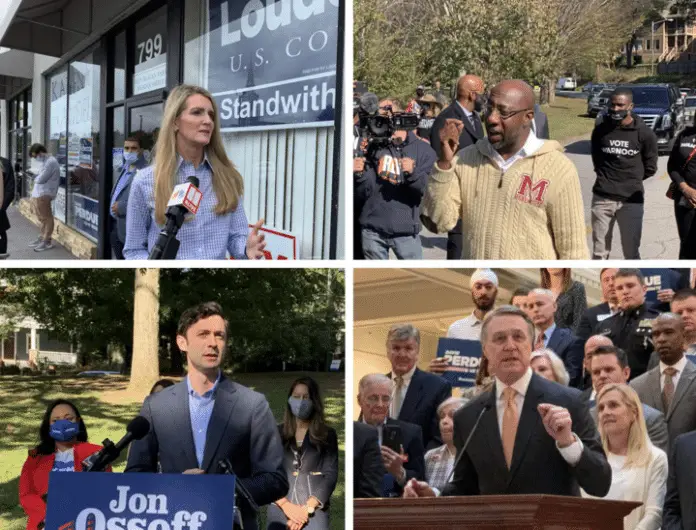Democrat Joe Biden flipped Georgia with a slim 13,000 vote lead, buoying the spirit of Democrats who have dubbed the state “Joe’gia” and angering President Donald Trump who continues to pursue legal challenges meant to overturn the results.
But whether Biden’s win here represents anything more than a fluke fueled by Trump-weary voters is one of the big questions left lingering after the now-certified results make Biden the first Democrat presidential candidate to win the state in three decades.
Georgians won’t have to wait long to get some answers: Democrats who came up short this month have another shot to try and rally enough support statewide to oust the state’s two sitting Republican U.S. senators.
Those runoffs, which are set for Jan. 5, have momentarily made Georgia the center of the political universe because of their potential to put the Senate in Democratic hands. Hundreds of millions of dollars will likely pour into these pivotal races as each side races to rally their bases after a hard-fought presidential election and in the midst of the holiday season and a worsening pandemic.
Jon Ossoff, who is an investigative journalist, will have to overcome an 88,000-vote gulf between him and Sen. David Perdue in this month’s three-way matchup with a libertarian candidate who siphoned away about 115,000 votes.
And Raphael Warnock, who is the pastor of Ebenezer Baptist Church in Atlanta, is now in a face-to-face runoff with Sen. Kelly Loeffler after a 20-person contest collectively produced about 48,000 more votes for the field of Republican candidates than the slate of Democrats. Loeffler, a finance executive, was appointed to the seat last year by Gov. Brian Kemp.
All four returned to the campaign trail even as Perdue and Loeffler called on the state’s top election official to resign over unspecified “failures” managing the election and as Trump’s refusal to concede complicates their campaigns. The two Republicans have united their campaigns, calling upon the GOP faithful to help “defend the majority” in the Senate and “save America.”
Ossoff and Warnock have also teamed up at times, casting the pair of runoffs as a referendum on Washington’s response to the pandemic and as a chance to advance policies that would protect and expand access to health care.
Georgia’s political status? It’s complicated
Democrats continue to gain strength in Atlanta’s sprawling and diversifying suburbs, which mirrors a pattern seen in other areas of the country. But that shift isn’t just happening at the top of the ballot.
Cobb and Gwinnett counties – which Hillary Clinton flipped in 2016 – just elected Democrats into local offices like district attorney and county commission chair. One of the few Democratic flips in the state House this year was claimed in Gwinnett; other Republican lawmakers hailing from the northern arc of Atlanta narrowly survived.
Warnock and Ossoff won Cobb and Gwinnett while running up the score in some of the state’s city centers, like Savannah, Augusta, Albany, Athens, Macon and of course Atlanta. Republicans cleaned up in much of rural Georgia.
The GOP, though, continues to dominate all of Georgia’s statewide offices, although Stacey Abrams famously came up about 55,000 votes short in her 2018 bid that nearly made her the first Black woman elected governor in the country.
The down-ballot success of Democrats this month indicates the pull to the left in these suburban counties may have staying power, said Amy Steigerwalt, a political science professor at Georgia State University. But as Georgia’s blue areas turn bluer, the conservative areas are also pulling harder to the right.
“Calling it a purple state isn’t quite right,” Steigerwalt said Thursday. “It’s really more like a twist ice cream cone, and so you’ve got really red and really blue and they’re kind of twisted up.
“They’re twisted but they’re really strong on each of them,” she added.
Steigerwalt said it’s also notable that Perdue, who is seen as a key Trump ally and former Fortune 500 CEO, fared slightly better than the president in metro areas. That could be a clue that Biden’s success here is possibly due to an anti-Trump mood.
Sarah Riggs Amico, who lost the Democratic primary to Ossoff and who backed Biden early on, dismissed the theory that Biden will claim Georgia’s 16 electoral votes because of the president’s unpopularity. But she argues Perdue and Loeffler are doomed either way.
“Even if that were true, it would still be very bad news for Kelly Loeffler and David Perdue,” Amico said. “Their entire campaigns were built around some crazy contest for fealty to Donald Trump, and you see it still today. You see it in them asking a Republican secretary of state, Brad Raffensperger, to resign – not because he did anything unethical or illegal but because the president doesn’t like him. That’s nuttier than a fruitcake.”
Regardless, the Republican party hopes Biden’s narrow margin of victory in Georgia will at least motivate their voters to return to the polls for the runoffs.
“I think in Georgia now people realize this is a competitive state. We have competitive elections here,” said Brian Barrett, southeastern political director for the Republican National Committee. “And I think there’s a lot of voters that we can talk to and say, ‘Hey, truly the election was down to the wire, your vote matters and sitting out on the sidelines does have real world consequences.’”
Long-time observers of Georgia politics know those tightening margins predate Trump, but the elections have recently become nail-bitingly close in recent years.
Andra Gillespie, a political science professor at Emory University, said the political climate in Georgia is reminiscent of the 1990s when elections became more competitive as white voters slowly migrated to the Republican party. By the early 2000s, the state had elected its first GOP governor since Reconstruction and flipped control of the Legislature. More competitive elections likely await the Peach State, with each party taking turns feeling the sting of defeat, she said.
“This time the story isn’t about the shift in white voting behavior so much as it is the growth of the non-white population which is breaking more Democratic than Republican for now,” Gillespie said.
The state’s growing diversity coupled with what Gillespie called a “non-trivial” number of liberal white voters has the potential makings of a powerful multi-racial coalition in Georgia.
‘We don’t need a distraction’
Nearly three weeks after Election Day, Trump continues to dispute the results in Georgia even after a full hand count. His campaign requested an official recount over the weekend and has said another lawsuit is coming.
That has caused some Georgia Republicans to worry aloud that the president’s long-shot bid to overturn the election results here will hurt Loeffler and Perdue in the runoffs where early polling continues to show a competitive fight.
So far, there have been three legal challenges in Georgia involving the Trump campaign or supporters: one was dismissed in Chatham County, another was voluntarily dismissed by the plaintiffs, and a third failed to convince a federal judge to step in and stop state election officials from certifying the vote Friday.
“We can’t just continue down this path of making wild statements when we’ve got two Senate candidates who have their heads down now and are running forward full steam,” former Georgia U.S. Sen. Saxby Chambliss, who is a Republican, said Friday on GPB’s Political Rewind radio show. “They need the full support of everybody in the Republican Party. We don’t need a distraction.”
There is also a risk that the president and his supporters’ attacks on the integrity of the election will undermine the GOP push to send two Republicans back to Washington, Steigerwalt said. Trump has alleged widespread voter fraud with absentee voting, questioned the reliability of the state’s new voting machines, dismissed the validity of the just-finished hand count and called out GOP state officials who are now receiving death threats.
“One possible real concern is that it’s going to depress turnout among Republicans,” Steigerwalt said. “Because the leader of their party and perhaps someone that they supported wholeheartedly is telling them that the system is illegitimate and can’t be trusted.
“So, if the system can’t be trusted, why would you then turn out to vote in it? That’s a real big issue that they’re going to have to address.”
Georgia Secretary of State Brad Raffensperger said this week that 24,000 Republicans who voted via absentee ballot in the June primary did not vote at all in the general election. “He actually depressed, suppressed his own voting base,” he told Atlanta’s WSB-TV.

Jill Nolin | Georgia Recorder
Jill Nolin has spent nearly 15 years reporting on state and local government in four states, focusing on policy and political stories and tracking public spending. She has spent the last five years chasing stories in the halls of Georgia’s Gold Dome, earning recognition for her work showing the impact of rising opioid addiction on the state’s rural communities. She is a graduate of Troy University.


